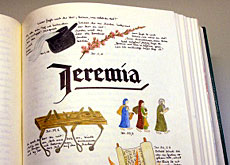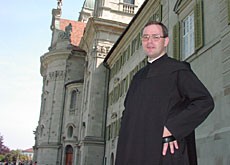Bringing the Bible back to life

The role of the Bible in shaping Western culture is undisputed, but interest in the text has been waning in recent decades.
The Year of the Bible 2003 in Switzerland attempted to revive knowledge of a book that continues to sell, but lies unread on many a shelf.
The organisers this week pronounced themselves happy with what had been achieved by the Year of the Bible, most notably the creation of a handwritten version of the book.
The motto for the Year of the Bible – “Seek and Find” – sought to generate interest in all the participating countries – Switzerland, Germany, Austria and France.
On Friday the working group for Christian churches said the project 2003 had succeeded beyond their expectations in stimulating interest in the Bible.
Word of mouth
No original version of the “Book of Books” exists, or indeed has ever existed. The text was compiled over more than 1,000 years, and constantly added to through stories handed down by word of mouth.
The latest handwritten version – created for the Year of the Bible – was produced over the course of a year by more than 2,000 men and women of all ages and is due to be launched next month. It contains six volumes.
The new version is written in German, French, Italian and Romansh – Switzerland’s four national languages – and includes passages in English, Spanish, Catalan, Portuguese, Polish, Tamil, Vietnamese, Serbian, Croatian and Romanian.
It will be displayed in cities and towns all over Switzerland in the coming weeks, after being presented in parliament on February 12.
“This handwritten Bible reflects the linguistic and cultural diversity of the people living in Switzerland,” the initiators of the Year of the Bible 2003 said.
“If you transcribe a text you get involved with it, which means you get absolutely absorbed in it,” said Martin Werlen, abbot of Einsiedeln Abbey.
Best-seller
More than 20 million copies of the Bible, which has been translated into more than 2,200 languages, are printed all over the world every year.
In Switzerland more than 60,000 copies are sold annually.
The organisers said numerous events launched by parishes, congregations, hospitals, libraries, museums and schools have stimulated the people’s interest in the Bible.
The Catholic community said it welcomed the Year of the Bible, but reformed Swiss churches did not share the enthusiasm.
“What do we need a Year of the Bible for – we are always dealing with the book anyway,” they argued.
Fundamentalism
Organisers also said they were worried that the campaign could be seen as Christian fundamentalism or that the contents of the Bible could be abused.
“These fears were not really unfounded, thinking about the war in Iraq,” Dieter Bauer of the Swiss Catholic Bible Society told swissinfo.
“Both sides have used God’s prayers for their own war goals. It’s wrong to use the Bible to justify wars or other crimes,” he added.
According to Bauer there are similar tendencies on the political scene in Switzerland. “It’s all about power, or about crusades, to achieve political and financial goals.”
“I think the only way to counteract such tendencies is dialogue. The Bible does more than just set down Christian beliefs, it is literature – and it’s open for interpretation,” Bauer said.
swissinfo
Twenty million copies of the Bible are printed every year.
In Switzerland more than 60,000 copies of the Bible are sold annually.
The Bible is considered to be an eternal bestseller.
The Bible has been translated into 2,287 languages.
The word “Bible” comes from Greek. The papyrus used to produce a cheap writing material is called biblos.
The Bible consists of the Old and New Testaments.
The Old Testament was written in Hebrew and Aramaic and consists of 39 books, the New Testament was written in Greek and consists of 27 books.
The oldest scripts date back to the period between 50 and 100 AD.

In compliance with the JTI standards
More: SWI swissinfo.ch certified by the Journalism Trust Initiative


You can find an overview of ongoing debates with our journalists here . Please join us!
If you want to start a conversation about a topic raised in this article or want to report factual errors, email us at english@swissinfo.ch.